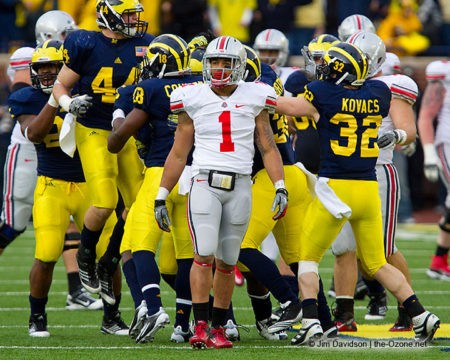There is a rhythm to college football Saturdays in the Midwest. A cadence of coffee, cool air, and the slow build toward kickoff. But for some in Ohio, that rhythm feels rushed—truncated by noon starts that leave little time for tailgates, traditions, or the full breath of game day. Now, one state lawmaker wants to change that. Representative Tex Fischer has introduced a bill that would ban most early kickoffs for Ohio’s state universities, with one notable exception: The Game. Ohio State vs. Michigan, in all its noon-soaked history, would remain untouched. Because some traditions, it seems, are too sacred to move.
Protecting the Afternoon: A Bill Rooted in Routine
The proposed legislation reads like a schedule with intent. Under Representative Fischer’s bill, college football games hosted by Ohio’s state universities would not begin before 3:30 p.m.—unless they qualify under a narrow set of exemptions. The goal? To preserve the fuller experience of game day, to grant fans time to gather, celebrate, and descend upon stadiums without rushing through the morning.
There is a rhythm to college football Saturdays in the Midwest. A cadence of coffee, cool air, and the slow build toward kickoff. But for some in Ohio, that rhythm feels rushed—truncated by noon starts that leave little time for tailgates, traditions, or the full breath of game day. Now, one state lawmaker wants to change that. Representative Tex Fischer has introduced a bill that would ban most early kickoffs for Ohio’s state universities, with one notable exception: The Game. Ohio State vs. Michigan, in all its noon-soaked history, would remain untouched. Because some traditions, it seems, are too sacred to move.
Rep. @texfischer is out with a bill designed to curtail the Big Ten from scheduling Ohio State football games at noon.
The bill includes an exception that allows the Michigan game to kick off in its traditional noon slot.
Buckeyes have been in heavy noon rotation thanks to Fox. pic.twitter.com/LHKSxgEOUI
— The Rooster (@rooster_ohio) May 15, 2025
The Noon That Stands Alone: Tradition Preserved for The Game
College football doesn’t run on logic—it runs on lore. And nowhere is that more true than in the annual showdown between Ohio State and Michigan. For decades, the rivalry has kicked off at high noon on the final Saturday of November, carving its own space into the sport’s calendar and its psyche.
The proposed bill acknowledges this. Carved into its language is an exemption that protects any “college football tradition” defined by longevity and consistency. The Ohio State-Michigan game, played more than 100 times with the vast majority of those games beginning at noon, easily qualifies.
November 20, 1999
#10 Michigan vs. Ohio State pic.twitter.com/qTmlYGmyRD— Random Michigan Play Every Day (@Michplay_a_day) April 18, 2025
In a time when conference realignments and media contracts have reshaped the college football landscape, Fischer’s bill takes care not to tamper with this specific tradition. For fans and alumni, that start time has become synonymous with anticipation—a moment when the frost still clings to the grass and the stakes feel impossibly high before lunch.
In preserving that noon kickoff, the bill concedes that not all early games are created equal. Some belong to television. But some, like The Game, belong to history.
Fox, Funding, and the Fans Left Waiting
The heart of the bill may be poetic, but its implications are tangled in policy, money, and media.
Fox Sports’ “Big Noon Saturday” has become a signature platform, rewarding the network with massive viewership by showcasing top teams in the early window. For Ohio State, this has meant prominence—but also repetition. Noon after noon, week after week. What’s gained in audience may come at the cost of atmosphere.
Still, those television contracts help fund the very programs that take the field. Ohio State and its Big Ten peers rake in millions annually, bolstered in part by Fox’s commitment to the noon slot. It’s unlikely that a law—no matter how symbolic—will outweigh the financial incentives of the current system.
And yet, Fischer’s bill joins a growing chorus of legislative efforts aimed at protecting college football’s pageantry. It comes just months after a bill was introduced to ban flag-planting—born from the emotional aftermath of Michigan’s 2024 win at Ohio Stadium.
These are more than political gestures. They are cultural signals. An insistence, from lawmakers and fans alike, that while the sport may evolve, the soul of it—rooted in ritual, rivalry, and rhythm—must endure.










